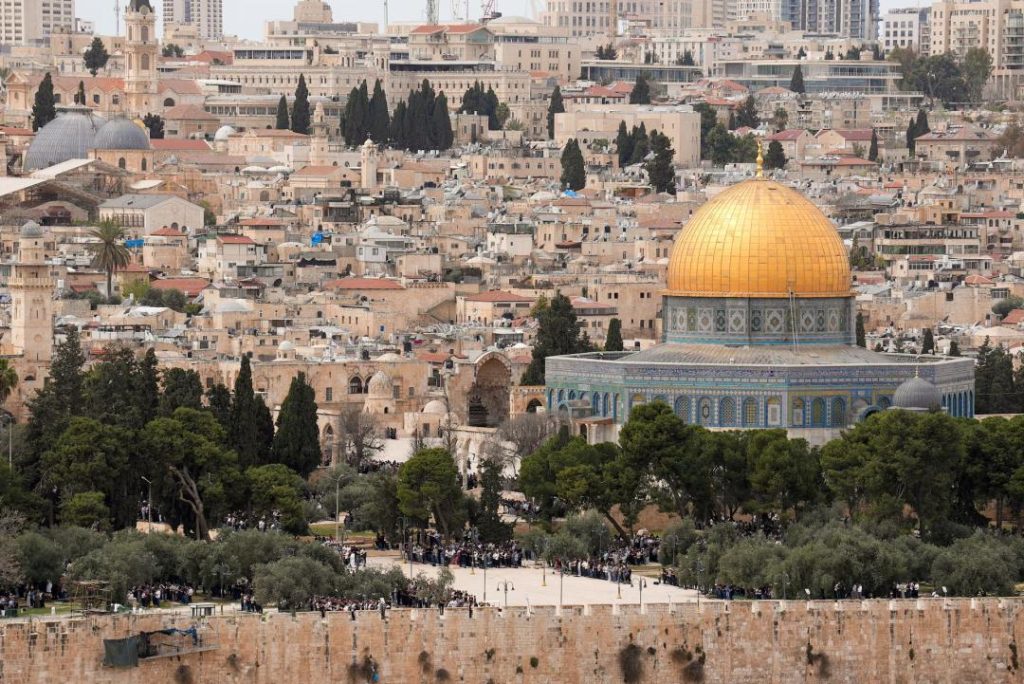
Jewish Israeli minister prays at Al-Aqsa mosque where Jews can’t pray
In a move that has sparked outrage and raised concerns, Israel’s far-right National Security Minister Itamar Ben-Gvir recently visited the Al-Aqsa mosque compound in Jerusalem and prayed there. This unprecedented action has been seen as a violation of the “status quo” arrangement with Muslim authorities, which allows Jews to visit the mosque but not to pray there.
The Al-Aqsa mosque compound, also known as the Temple Mount, is a highly contested and sensitive site in Jerusalem. It is considered the holiest site in Judaism and is also revered by Muslims as the third holiest site in Islam. The site is managed by the Islamic Waqf, a Muslim religious authority, and is subject to a delicate arrangement between Israel and the Muslim authorities.
Under the current agreement, Jews are allowed to visit the site, but are not permitted to pray there. This is because the site is considered too sacred for Jewish prayer, and any attempt to pray there is seen as a provocation by the Muslim authorities. However, this arrangement has not stopped Jewish extremists from trying to pray at the site, leading to clashes with Muslim worshippers and Israeli security forces.
Ben-Gvir’s visit and prayer at the Al-Aqsa mosque compound has been widely condemned by Muslim leaders and officials. Hamas, the Palestinian Islamist group, has called the move “an escalation of aggression against the Palestinian people” and has warned of the consequences of such actions.
The Palestinian Authority has also strongly condemned the move, with the Palestinian President Mahmoud Abbas calling it “a grave violation of the status quo” and a “threat to the fragile calm” in the region. The Palestinian Minister of Foreign Affairs, Riyad al-Malki, has also expressed his outrage, saying that “the Israeli occupation is trying to provoke a religious war” by allowing a Jewish minister to pray at the site.
The Israeli government has defended Ben-Gvir’s visit, saying that it was a “private visit” and that the minister was exercising his right to freedom of worship. However, many have seen the move as a deliberate provocation and an attempt to undermine the status quo arrangement.
The visit has also been condemned by many Jewish leaders and organizations, who have expressed concern that it could lead to further violence and instability in the region. The Israeli Chief Rabbi, David Lau, has called on the government to “ensure the status quo” at the site, saying that “the Temple Mount is a sacred place for the Jewish people, and we must ensure that it is preserved for future generations”.
The Al-Aqsa mosque compound has long been a flashpoint in the Israeli-Palestinian conflict. The site is seen as a symbol of the disputed status of Jerusalem, which is claimed by both Israelis and Palestinians as their capital. The Israeli government has long sought to expand its control over the site, and has been accused of trying to erase Palestinian history and identity in the city.
Ben-Gvir’s visit and prayer at the Al-Aqsa mosque compound has raised concerns that the Israeli government is seeking to exploit the site for political gain. His far-right ideology has been widely criticized, and many have accused him of being a provocateur who seeks to stir up conflict and tension in the region.
The consequences of Ben-Gvir’s visit are still unclear, but it is likely to further escalate tensions in the region. The visit has already been condemned by many around the world, and it is likely to be seen as a major setback for efforts to promote peace and stability in the Middle East.



